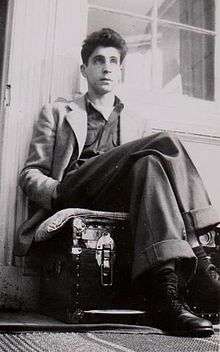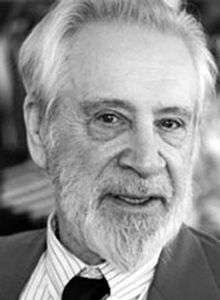Anthony Hecht

Anthony Evan Hecht (January 16, 1923 – October 20, 2004) was an American poet. His work combined a deep interest in form with a passionate desire to confront the horrors of 20th century history, with the Second World War, in which he fought, and the Holocaust being recurrent themes in his work.[1]
Biography
Early years
Hecht was born in New York City to German-Jewish parents. He was educated at various schools in the city - he was a classmate of Jack Kerouac at Horace Mann School - but showed no great academic ability, something he would later refer to as "conspicuous." However, as a freshman English student at Bard College in New York he discovered the works of Stevens, Auden, Eliot, and Dylan Thomas.[2] It was at this point that he decided he would become a poet. Hecht's parents were not happy at his plans and tried to discourage them, even getting family friend Ted Geisel, better known as Dr. Seuss, to attempt to dissuade him.
In 1944, upon completing his final year at Bard, Hecht was drafted into the 97th Infantry Division and was sent to the battlefields in Europe.[3] He saw combat in Germany in the "Ruhr Pocket"[4] and in Cheb in Czechoslovakia. However, his most significant experience occurred on April 23, 1945 when Hecht's division helped liberate Flossenbürg concentration camp. Hecht was ordered to interview French prisoners in the hope of gathering evidence on the camp's commanders. Years later, Hecht said of this experience,
The place, the suffering, the prisoners' accounts were beyond comprehension. For years after I would wake shrieking.[2]
Career

After the war ended, Hecht was sent to Japan, where he became a staff writer with Stars and Stripes.[5] He returned to the US in March 1946 and immediately took advantage of the G.I. bill to study under the poet-critic John Crowe Ransom at Kenyon College, Ohio. Here he came into contact with fellow poets such as Randall Jarrell, Elizabeth Bishop, and Allen Tate. He later received his master's degree from Columbia University. In 1947 Hecht attended the University of Iowa and taught in the Iowa Writers' Workshop, together with writer Robie Macauley, with whom Hecht had served during World War II,[6] but, suffering from post-traumatic stress disorder after his war service, gave it up swiftly to enter psychoanalysis.[7]
Hecht released his first collection, A Summoning of Stones, in 1954. In this work his mastery of a wide range of poetic forms were clear as was his awareness of the forces of history, which he had seen first hand. Even at this stage Hecht's poetry was often compared with that of Auden, with whom Hecht had become friends in 1951 during a holiday on the Italian island of Ischia, where Auden spent each summer. In 1993 Hecht published The Hidden Law, a critical reading of Auden's body of work. During his career Hecht won many fans, and prizes, including the Rome Prize in 1951 and the 1968 Pulitzer Prize for Poetry for his second work The Hard Hours. It was within this volume that Hecht first addressed his own experiences of World War II - memories that had caused him to have a nervous breakdown in 1959.[8] Hecht spent three months in hospital following his breakdown, although he was spared electric shock therapy, unlike Sylvia Plath, whom he had encountered while teaching at Smith College.
Hecht's main source of income was as a teacher of poetry, most notably at the University of Rochester, where he taught from 1967 to 1985. He also spent varying lengths of time teaching at other notable institutions such as Smith, Bard, Harvard, Georgetown, and Yale.[9] Between 1982 and 1984, he held the esteemed position of Poet Laureate Consultant in Poetry to the Library of Congress. Hecht won a number of notable literary awards including: the 1968 Pulitzer Prize for Poetry (for the volume The Hard Hours), the 1983 Bollingen Prize, the 1988 Ruth Lilly Poetry Prize, the 1989 Aiken Taylor Award for Modern American Poetry, the 1997 Wallace Stevens Award, the 1999/2000 Frost Medal, and the Tanning Prize.[10]
Hecht died October 20, 2004, at his home in Washington, D. C.;[1] he is buried at the cemetery at Bard College. One month later, on November 17, Hecht was awarded the National Medal of Arts, accepted on his behalf by his wife, Helen Hecht.[11]
The Anthony Hecht prize is awarded annually by the Waywiser press.[12]
Bibliography
- Poetry
- A Summoning of Stones (1954)
- The Hard Hours (1967)
- Millions of Strange Shadows (1977)
- The Venetian Vespers (1979)
- The Transparent Man (1990)
- Flight Among the Tombs (1998)
- The Darkness and the Light (2001)
- Translations
- Aeschylus's Seven Against Thebes (1973) (with Helen Bacon)
- Other Works
- Obbligati: Essays in Criticism (1986)
- The Hidden Law: The Poetry of W. H. Auden (1993)
- On the Laws of the Poetic Art (1995)
- Melodies Unheard: Essays on the Mysteries of Poetry (Johns Hopkins University Press) (2003)
References
- 1 2 Shapiro, Harvey (October 22, 2004). "Anthony Hecht, a Formalist Poet, Dies at 81". The New York Times.
- 1 2 Matt Schudel (October 22, 2004). "Poet, Essayist Anthony Hecht Dies at 81". Washington Post.
- ↑ Jonathan Post, The Selected Letters of Anthony Hecht, The Johns Hopkins University Press; Nov 27, 2012. ISBN 978-1421407302
- ↑ Geoffrey Lindsay, "Anthony Hecht, Private First Class." Yale Review. 2008, Vol. 96. Issue 3. pp. 1-26
- ↑ Geoffrey Lindsay, "Anthony Hecht in Occupied Japan." Sewanee Review, 2011, 119 (4). pp 641-655.
- ↑ Kennedy, Thomas E., "A Last Conversation with Robie Macauley," Agnii, Vol. 45, 1997.
- ↑ Anthony Hecht, obituary
- ↑ Philip Hoy, Anthony Hecht in Conversation with Philip Hoy. London: Between the Lines, 2004.
- ↑ "Anthony Hecht". The Daily Telegraph. London. October 25, 2004.
- ↑ Elizabeth A. Brennan, Elizabeth C. Clarage, eds. (1999). Who's who of Pulitzer Prize winners. Greenwood Publishing Group. ISBN 978-1-57356-111-2.
- ↑ National Endowment for the Arts - 2004 National Medal of Arts
- ↑ The Anthony Hecht Poetry Prize
External links
- Works by Anthony Hecht at Project Gutenberg
- Works by or about Anthony Hecht at Internet Archive
- J. D. McClatchy (Fall 1988). "Anthony Hecht, The Art of Poetry No. 40". The Paris Review.
- Modern American Poetry Society
- Hecht's page at Academy of American Poets
- Anthony Hecht Poetry Prize